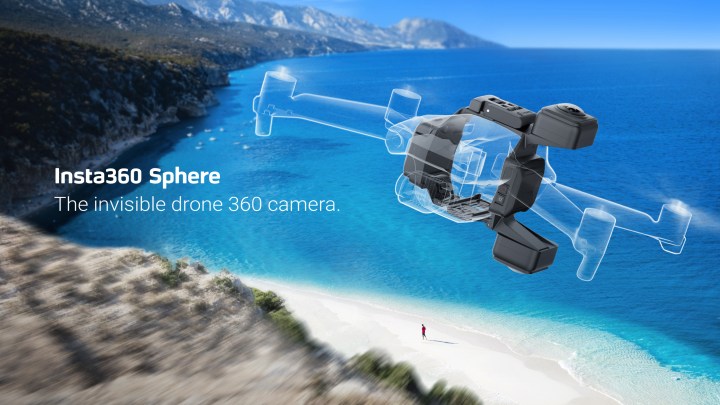On paper, drones and 360 cameras go together like pineapple and pizza, that is to say, they are an excellent if rather niche combination. However, the problem has always been when filming with a camera that sees everything, that the view also includes whatever the camera is attached to. This means that filming with a 360 camera on a drone feels more like riding a speeder on Endor than flying unsupported through the sky. The Insta360 Sphere solves this issue by turning the drone invisible, thus fully immersing you in the experience of flight.
The Sphere accomplishes this by placing one lens on top of the drone and one beneath. The Sphere then uses software to stitch the footage from each half together so that the drone vanishes from the video, creating a seamless sphere. It’s exclusively compatible with the Mavic Air 2 and Air 2S drones from DJI and has been designed so that it doesn’t interfere with the structural integrity or various wireless systems on the drone, such as GPS. The Sphere clamps on securely around the middle of the drone in such a way that vital sensors aren’t obscured.

It’s lightweight, but it should also be noted that the Sphere will slightly decrease your drone’s battery life. The camera itself has an estimated recording time of 48 minutes on a single charge. I typically record aerial 360 videos of 3 to 5 minutes in length, so in my experience, the Sphere should be good for 8 recording sessions without needing a recharge.
The Sphere’s camera is very similar in its specifications to Insta360’s other current 360 cameras, shooting at up to 5.3k resolution in 30, 25, or 24 frames per second, and with a bit rate of 100Mbps. It can also capture spherical photos at up to 6080 x 3040 resolution and features both Wi-Fi and Bluetooth connectivity. A variety of modes are available in the camera, such as timelapse or bullet time, and the Sphere implements Insta360’s excellent FlowState video stabilization for beautifully smooth footage.
The 360 footage captured with the sphere can be edited on desktop or mobile devices either in Insta360’s own applications or in Adobe Premiere via a plugin. I personally prefer to edit my 360 footage in Insta360’s IOS app on an iPad Mini 6, which is a highly intuitive way to reframe your footage or implement various cool effects like barrel rolls and dolly zoom.
I’m excited to get my hands on the Sphere and put it through its paces. It promises to add an unprecedented level of accessibility to aerial 360 video creation. The DJI Air 2S is one of my all-time favorite drones, and the Sphere is by far the most intriguing third-party accessory available for it. Stay tuned for my full review of the Insta360 Sphere here at Digital Trends.
The Insta360 Sphere is available today for $430 in the U.S. and Mainland China.
Editors’ Recommendations
